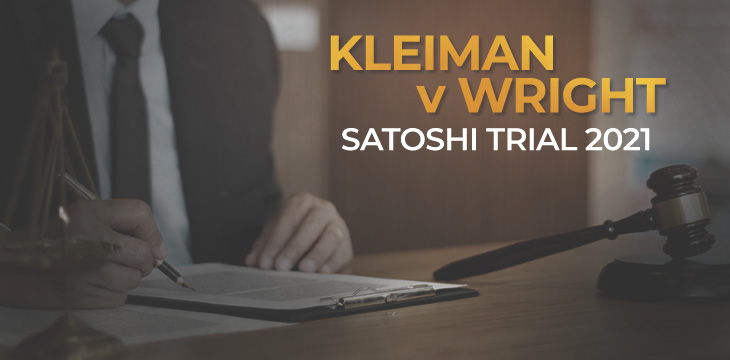Bitcoin’s “trial of the century” has stopped pretending it’s about enriching Ira Kleiman and it now appears to be a full-throated effort to diminish Bitcoin creator Dr. Craig Wright before his technological invention can achieve mainstream acceptance.
Attorneys representing plaintiff Ira Kleiman spent the final days of their presentation quizzing their cyber security expert Dr. Matthew Edman about multiple documents, many of which purport to be communications between Wright and Ira Kleiman’s late brother Dave, Wright’s former colleague and close friend who died in April 2013 after years of poor health.
Ira filed his civil suit against Wright in the belief that Wright and Dave co-created Bitcoin and collaborated on a Bitcoin mining project that amassed over 1.1 million BTC tokens currently worth over $70 billion. After Dave died, Ira claims Wright—the individual behind the Satoshi Nakamoto pseudonym credited with authoring the Bitcoin white paper—hatched a plan to deprive Dave’s estate of his share of the BTC by literally rewriting history.
This week, Edman testified that the metadata of the aforementioned communications between Dave and Wright had been altered to appear as if they were written before Dave died. Ira’s attorneys pushed Edman to declare each of these documents to be forgeries, with the implication that Wright is the man behind the manipulated metadata.
Thing is, the content of these documents largely centers on the nature of the business relationship between Wright and Dave. And if these documents are forgeries, then the whole premise of a Wright/Dave partnership to mine BTC falls by the wayside.
Summary of the plaintiff's side of the case
##kleimanvsWright #Bitcoin #BSVisBitCoin pic.twitter.com/3SwuvPRA75
— Donald 🐘 (@disco_donald) November 17, 2021
In other words, Ira’s attorneys appeared to be undercutting the entire foundation of their client’s principal argument that Dave’s estate is owed a share of this 1.1 million BTC. Small wonder then that Wright’s legal team filed a motion for early judgment after Ira’s attorneys pulled their bait-and-switch.
Follow the money
Just what would possess attorneys Velvel Freedman and Kyle Roche to turn on their client in something bordering on legal malpractice? Perhaps it’s because Ira—who couldn’t even be bothered to show up for Day 2 of his own trial—is merely a beard for the firm’s real clients. Those would be the unknown individuals/entities who provided capital to BTCN 1610-491, LLC, an offshoot of third-party litigation funding outfit Parabellum Capital.
We’ve previously speculated on the identities of the deep-pocketed shadows who allegedly provided tens of millions to Roche Freedman LLP to bankroll this lawsuit and to buy our Ira. Most of these suspects are major players in the BTC ecosystem, all of whom would suffer significant blows to their holdings in the event that the true Bitcoin technology (BSV)—which unlike BTC offers infinitely scaling blocks and cost-effective microtransactions—gains a wider audience.
Chief among these well-heeled suspects is the Digital Currency Group (DCG), the Barry Silbert-led venture capital alliance that has become cryptocurrency’s Goliath, holding large and/or controlling stakes in everything from exchanges (Coinbase) to stablecoins (Circle) to crypto media (CoinDesk) to companies building ‘layer 2’ solutions that attempt to compensate for BTC’s on-chain scaling limitations (Blockstream).
Clearly, DCG has a very real stake in identifying any and all potential threats to BTC that appear on the horizon and nuking them before they can do any real damage. BSV poses such a threat, so what better way to undercut its appeal than to perform a very public character assassination of Bitcoin’s creator?
Plan B(SV)
The belief that Wright is Satoshi in human form was always at the center of Ira’s lawsuit and was taken as a given by both sides. Without that understanding, there would be no use fighting over access to the fabled cache of 1.1 million BTC that has laid dormant since Bitcoin’s early days.
Mainstream media outlets picked up on this mutual acceptance, dubbing the trial a fight over Satoshi’s BTC. (Even CoinDesk briefly got into the act until Silbert’s brother publicly scolded them on Twitter.) The anti-BSV faction howled with outrage (and apprehension) at the idea that Wright would be treated as Satoshi by such venerable publications as the Wall Street Journal, and the implications this could have for their financial interests in BTC.
This article should have never seen the light of day. C'mon gang. Headline alone is absolutely awful.
— Alan Silbert (@alansilbert) November 2, 2021
That could explain the abrupt change in strategy displayed this week by Ira’s competent attorneys. Any concern over securing a fat payday for Ira—most of which would actually go to those financial backers—went out the window, replaced by a desire to paint Wright as a gutter-mouthed fraud, an opportunistic conman, anything that might prevent the general public from viewing Wright as a gifted polymath who gave the world one of the most exciting technological creations in history.
It may seem odd that an entity that invested tens of millions in the hopes of realizing a historic award in the tens of billions would jettison this strategy even before Wright’s defense got underway, but that only serves to underscore their desire to preserve BTC’s current dominance atop the crypto token value charts. And clearly, Plan B has been an option in their playbook from the start.
Check out all of the CoinGeek special reports on the Kleiman v Wright YouTube playlist.
New to blockchain? Check out CoinGeek’s Blockchain for Beginners section, the ultimate resource guide to learn more about blockchain technology.








